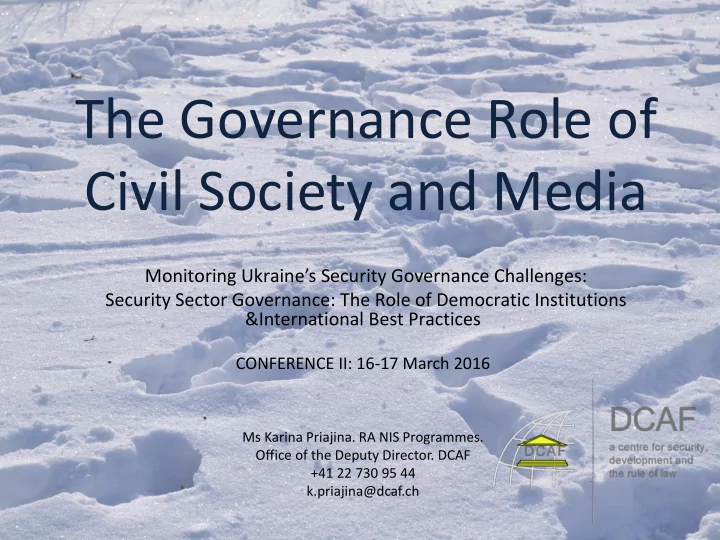

The Governance Role of Civil Society and Media Monitoring Ukraine’s Security Governance Challenges: Security Sector Go ver nance: The Role of Democratic Institutions &International Best Practices CONFERENCE II: 16-17 March 2016 Ms Karina Priajina. RA NIS Programmes. Office of the Deputy Director. DCAF +41 22 730 95 44 k.priajina@dcaf.ch
The Role of Civil Society Organisations (CSOs) in Security Sector Governance (SSG) • Communication • Information • Education • Representation • Expertise • Oversight • Human Resources
The Role of Civil Society
How can civil society contribute to Good Security Sector Governance • Research and information • Advocacy • Awareness-raising • Training • Monitoring • Legal assistance • Budget analysis • Capacity-building • Organisational credibility • Cooperation
Key partnerships and networks International Organisations • Government Media • Parliament Other CSOs • Ombuds Institutions Ombudsman • Other CSOs Parliament • Media Govern ment • International Organisatio ns
Key qualities of CSOs • Strategic vision and Strategic Action • Integrity • Transparency and Accountability • Independence • Expertise • Capacity and Organisation • Connections and Coordination • Credibility
Civil Society and Building Integrity • Oversight • Whistle-blowing • Awareness-raising • Trainings • Expertise • Monitoring
Issues and Challenges • Lack of implementation of good governance legislation • Lack of tools and infrastructure for oversight and participation • Media concentration • Over-complicating SSR issues and topics (exclusive language) • Lack of coordination between CSOs • Lack of whistle-blower protection • Secrecy culture of the Security Sector • Corruption • Lack of capacity and organisation
Recommendations • Cooperation and coordination • Clear legal provisions • Effective implementation • Organised and informed donor support • Language should be simple and understandable • Debate should encourage public participation • Institutionalised channels for communication • Oversight and monitoring • Awareness raising on Building Integrity • Specialised expertise and trainings for security sector personnel, parliamentarians, civil society and the public.
Conclusions • Civil Society plays a crucial role in SSG. It contributes to making the Security Sector and the Government transparent, accountable, representative, effective, efficient, legitimate democratic. • Civil society needs space and tools to fulfil its SSG role. • Without a healthy and active civil society, there is no democracy.
All the publications featured in this presentation are available at: www.dcaf.ch
Recommend
More recommend